There are many different types of hitch pins available on the market, but it can be tough to figure out which one is right for your needs.
In this post, we’ll explore the different types of hitch pins and their uses.
We’ll also provide tips on how to choose the right type of hitch pin for your needs.
Types of Hitch Pins
There are most common 7 types of trailer hitch pins that are used to secure a trailer to a vehicle.
These include bridge pins, double-loop pins, lock pins, grip clips, hair pins, e-clips, and x-rings.
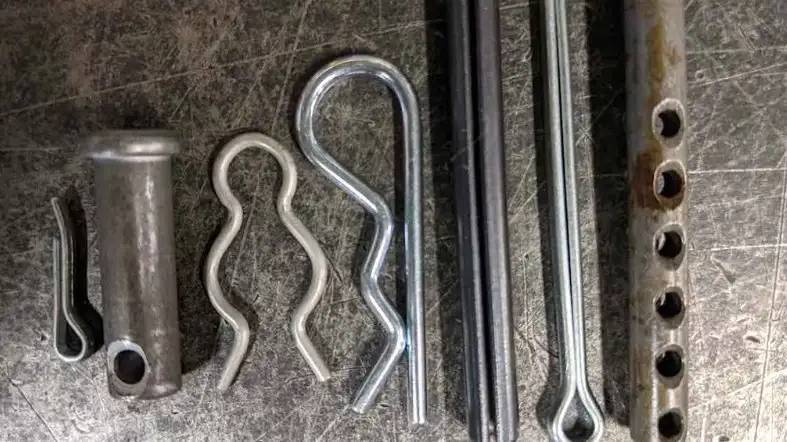
Bridge pins:
Bridge pins are the most basic type of hitch pin, consisting of a simple metal rod with a loop on one end.
They are inserted into the hole on the trailer hitch and then secured with a cotter pin or hairpin through the loop on the other end.
Bridge pins are inexpensive and easy to use, but they do not provide much security, as they can be easily removed by anyone with a pair of pliers.
Double-loop pins:
Double-loop pins are similar to bridge pins, but they have two loops on either end instead of just one.
This allows them to be secured with a cotter pin or hairpin on both ends, providing additional security.
They are also easy to use and relatively inexpensive, but they are not as secure as some other types of hitch pins.
Lock pins:
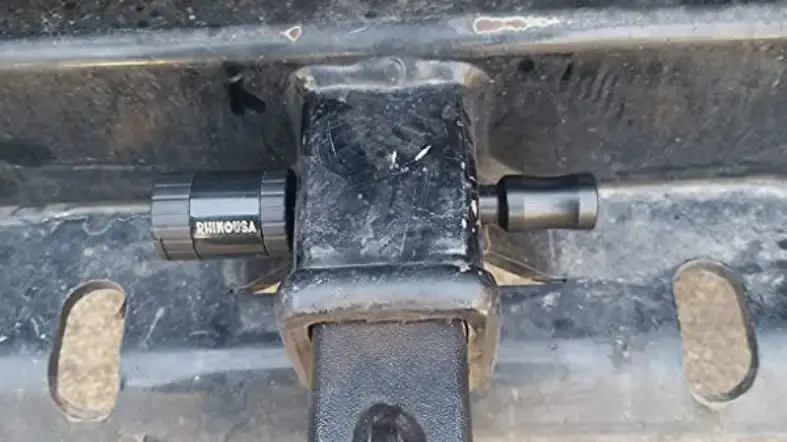
Lock pins are designed to provide added security by incorporating a locking mechanism into the design.
These pins typically have a keyed lock or a combination lock on one end, which prevents unauthorized removal.
They are more secure than a bridge or double-loop pins, but they are also more expensive and can be more difficult to use.
Grip clips:
Grip clips are another type of hitch pin that provides added security by incorporating a spring-loaded mechanism into the design.
These pins have a flexible, rubber-coated handle that grips the hitch when inserted, preventing the pin from being pulled out.
They are easy to use and provide a good level of security, but they are not as secure as lock pins.
Hair pins:
Hairpins, also known as cotter pins, are a simple and inexpensive way to secure a hitch pin in place.
They consist of a metal wire with a bent end that is inserted through the loop on the hitch pin and then bent to secure it in place.
Hair pins are easy to use and provide a good level of security, but they can be easily removed with pliers or other tools.
E-clips:
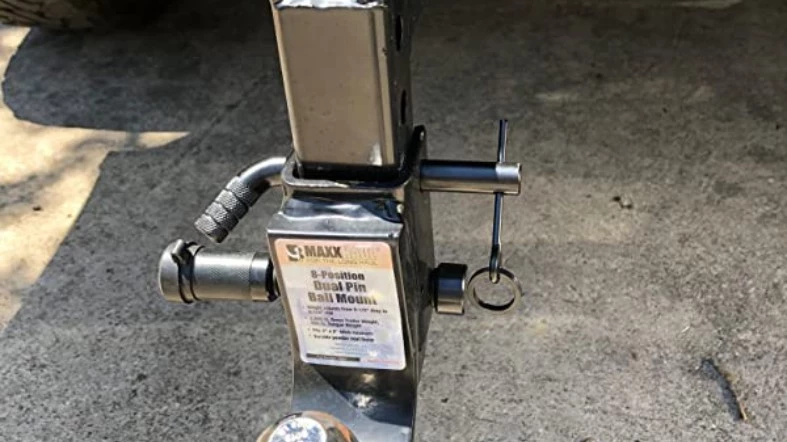
E-clips are another type of hitch pin that uses a spring-loaded mechanism to provide added security.
These pins have a flexible, rubber-coated handle that grips the hitch when inserted, preventing the pin from being pulled out.
They are easy to use and provide a good level of security, but they are not as secure as lock pins.
X-rings:
X-rings, also known as locking rings, are a type of hitch pin that uses a locking mechanism to provide added security.
These pins have a spring-loaded mechanism that grips the hitch when inserted, preventing the pin from being pulled out.
They are easy to use and provide a good level of security, but they are not as secure as lock pins.
What are Hitch Pins Used For?
Hitch pins are used for a variety of different applications, depending on the type and size of your vehicle.
They can be used to secure everything from bikes and kayaks to campers and trailers.
Some people even use hitch pins to attach larger tools or equipment, such as tow ropes, shovels, snow blowers, or lawnmowers.
Pros and Cons Of Hitch Pins
Here are some of the pros and cons of using hitch pins to secure your items:
Pros:
- Durable and strong construction
- Versatile – can be used for a variety of different applications
- Easy to use and install
Cons:
- May not be suitable for very heavy or large items, as they may not provide adequate support
- Requires a locking device or clip to ensure that the pin stays in place and does not come loose
Hitch Pins Are Best For Which Work?
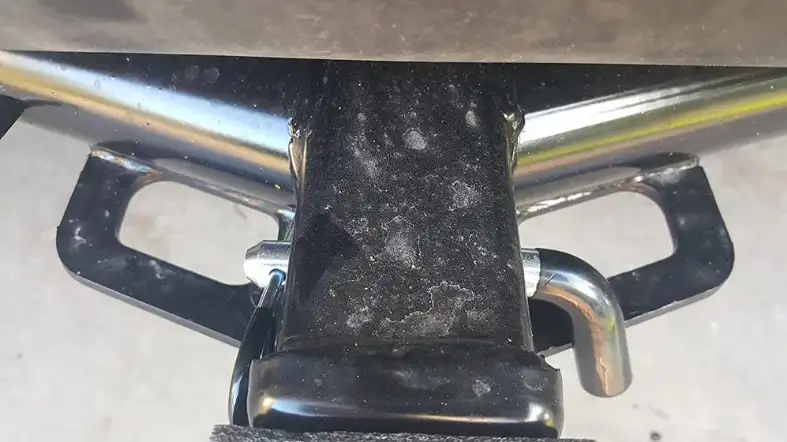
Hitch pins are best suited for use with lightweight, smaller items that need to be securely attached to your vehicle.
You can use them to attach bikes, kayaks, campers, trailers, tools, and other pieces of equipment.
However, they may not be suitable for larger or heavier items that need more support.
Additionally, it is important to use a locking device or clip with your hitch pins to ensure that they stay in place and do not come loose over time.
Some other types of hitch pins:
Cotterless Ring Pin
A ‘cotterless ring pin’ is a type of hitch pin that does not require cotters to be installed.
A cotter is a metal loop that attaches to the back side of the hitch and secures it to the shackle or similar member with which it is to be used.
The cotter pin is inserted through the loop, thereby securing it and preventing the hook from becoming unlatched inadvertently.
A cotterless ring pin’ often has a “keyhole” or circular shape in its rear surface that accommodates round-sectioned eye bolts, shackles, and other hardware devices.
What is Cotterless Ring Pin used for?
Cotterless ring pins are commonly used to secure hooks, shackles, and other hardware devices in applications where there is a need for quick and easy attachment and detachment.
They can be utilized in both industrial and consumer applications, such as in manufacturing, construction, automotive repair and maintenance, and around the home or office.
Pros and Cons Of Cotterless Ring Pin
Below we will give some pros and cons of using a Cotterless Ring Pin as well as the alternatives.
Pros:
1. Cotterless Ring Pins are quick and easy to install, making them a popular choice for many vehicle owners.
2. They offer a high level of stability and strength, making them ideal for heavy-duty applications.
3. Unlike some other hitch pin types, they do not require the use of any tools for installation or removal, which can be a major advantage in certain situations.
4. They are generally considered to be very affordable and cost-effective, making them a good choice for many budget-conscious vehicle owners.
Cons:
1. Although they offer a high level of stability and strength, Cotterless Ring Pins may not be suitable for all heavy-duty applications.
2. They can be more prone to corrosion and rust than some other hitch pin types, which may require regular cleaning or maintenance in certain climates or environments.
3. Some vehicle owners may find them less secure or secure than other types of hitch pins, which can be a major concern for safety-conscious drivers.
Cotterless Ring Pin is best for which work?
Cotterless Ring Pins are best suited for heavy-duty applications that require quick and easy installation, high levels of stability and strength, and minimal maintenance.
Depending on your specific needs and preferences, however, you may also want to consider some of the alternatives, such as cotter pins or locking hitch pins. Ultimately, the
Detent Hitch Pin
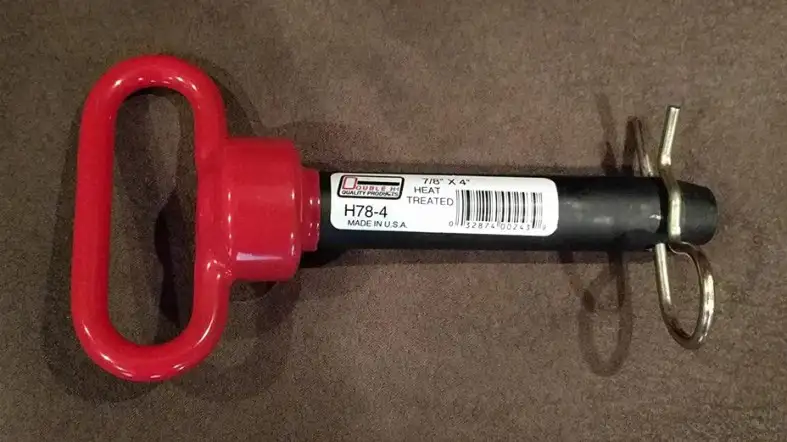
Sets are a new type of hitch pin, in which the ball detent is covered with an outer non-stainless steel cover.
Their purpose is to keep the hitch ball from bouncing out at highway speeds and give more protection during theft attempts.
Also known as Key Lock pins, these are very similar in design but don’t offer as many protection assets.
One big difference is that they don’t have a key which makes them more convenient to use.
What is Detent Hitch Pin Used for?
The main use for detent hitch pins is to keep a trailer ball from bouncing out of the coupler.
Detent hitch pins are an important part of coupling your trailer to your vehicle.
These pins feature a ball detent design that helps keep the trailer ball securely in place, even at highway speeds.
They are also designed with a protective outer cover to help prevent damage during theft attempts.
Whether you’re using a detent hitch pin for your travel trailer, utility trailer, or other types of trailers, it is an essential piece of equipment that will ensure your loads are securely fastened and safe from theft.
Pros and Cons Of Detent Hitch Pin
Here are some pros and cons of using a detent hitch pin to secure your trailer ball:
Pros:
1. Easy to use and install.
2. Provides added protection against theft attempts.
3. Designed with high-quality materials for durability and long-lasting performance.
Cons:
1. Can be slightly more expensive than other types of hitch pins.
2. May not provide as much protection against heavy impacts, especially in high-traffic areas where the ball is constantly bouncing up and down.
Detent Hitch Pin is best for which work?
A detent hitch pin is a great choice for anyone who needs to secure a trailer ball in their vehicle, especially when traveling at high speeds or in high-traffic areas.
It is also ideal for anyone who wants to protect their trailer from theft, as the protective outer cover helps deter would-be thieves and makes it more difficult for them to access the ball.
Bent Hitch Pin
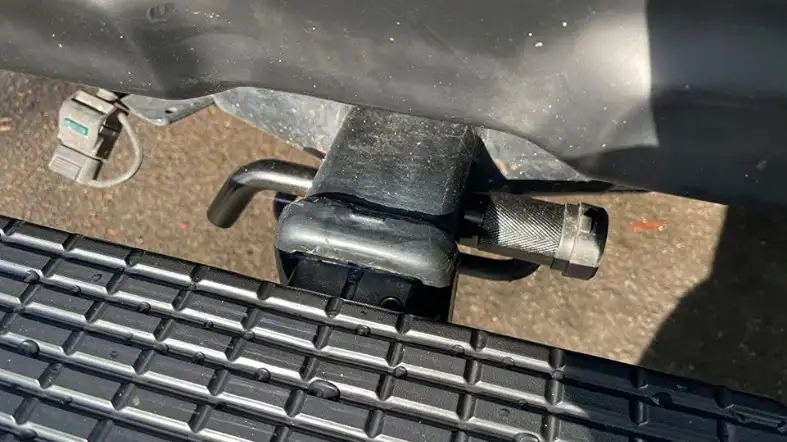
The bent hitch pin is one of the most common types of hitch pins.
It is commonly used on trailer and tow dollies that have a 2-inch coupler. You can find bent hitch pins in galvanized steel, stainless steel, and even aluminum.
What is Bent Hitch Pin used for?
Below we will give some uses for the bent hitch pin.
1. The first use is on a trailer tow dolly with a 2″ coupler. A bent hitch pin can be used to secure your car or vehicle for safe transportation.
2. Another common use of the bent hitch pin is to secure cargo in a truck bed.
The metal bar that holds up the bed of the truck can be secured with a bent hitch pin to keep your items in place.
3. Lastly, bent hitch pins are often used for securing gates on farms and barns.
If you have a large gate that needs to stay closed, you can use a bent hitch pin to make sure it remains in place.
Pros and Cons Of Bent Hitch Pin
Here are some pros and cons to consider when using a bent hitch pin.
Pros:
1. Bent hitch pins are durable, and can easily be used for a variety of purposes.
2. Bent hitch pins are easy to install, as they only require a hammer to secure them in place.
3. They come in different sizes and materials, allowing you to find the perfect fit for your needs.
4. A bent hitch pin is typically less expensive than other types of hitch pins.
Cons:
1. Since bent hitch pins come in different lengths, it may be difficult to find the perfect size for your needs.
2. Bent hitch pins can become dislodged easily if not secured properly.
Bent Hitch Pin is best for which work?
Bent hitch pins are best suited for a variety of work applications.
They are durable and easy to install, making them ideal for securing cargo in the truck bed or on farm gates.
Additionally, bent hitch pins come in a variety of sizes, materials, and styles, allowing you to find the perfect fit for your needs.
However, it is important to secure your bent hitch pin properly, as it can easily become dislodged if not used correctly.
How Do I Know Which Hitch Pin I Need?
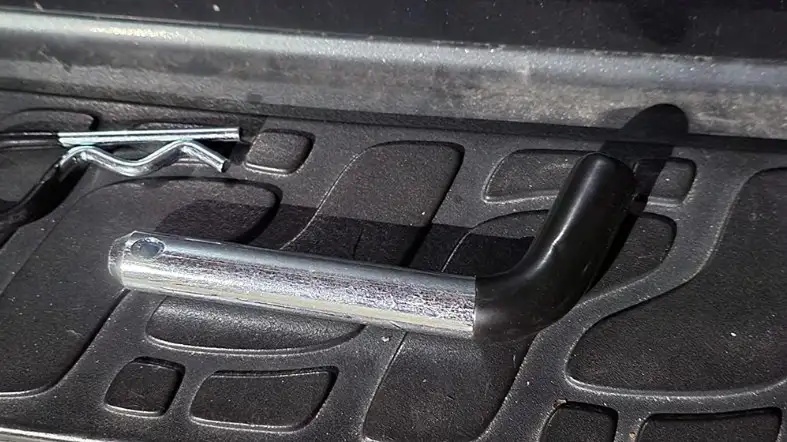
It is not very difficult to find Which type of Hitch Pin you Need. First, you must know what type of hitch pin you already have.
There are different types of hitch pins, and each has a different purpose.
There are three main types or categories of hitch pins: standard, adjustable, and locking.
Standard hitch pins are the most common type of hitch pin, and they provide a basic, reliable way to connect your trailer to your vehicle.
Adjustable hitch pins are similar to standard hitch pins, but they have an adjustable length that allows you to customize the connection between your trailer and your vehicle.
Locking hitch pins are designed to provide added security, as they cannot be removed without a key or tool.
So It depends on your needs and the type of trailer that you are using.
If you have a standard trailer, with no additional needs for security or adjustability, then a standard hitch pin will likely work just fine for you.
What is the difference between a cotter pin hitch pin and a clevis pin hitch pin?
A cotter pin hitch pin has a split end that is bent to secure it in place, while a clevis pin hitch pin has a hole through which a cotter pin or wire is inserted to secure it.
What is the difference between a hitch pin and a cotter pin?
A hitch pin is a type of fastener used to secure a trailer or other implement to a hitch.
It typically has a circular or cylindrical shape and is secured in place with a clip or lock.
A cotter pin, on the other hand, is a type of fastener that has a split pin design and is used to hold two objects together by passing through a hole in one object and then being bent to secure the second object in place.
What is the difference between a locking hitch pin and a non-locking hitch pin?
A locking hitch pin is designed to prevent unauthorized removal of the pin from the hitch.
It typically has a locking mechanism such as a keyed lock or combination lock to keep the pin in place.
A non-locking hitch pin, on the other hand, is simply secured in place with a clip or other fastening device but can be easily removed without key or special tools.
Conclusion
Now you know how to choose the right hitch pin for your trailer, based on its type and your individual needs.
Also know that different types of hitch pins have different benefits and features, so it is important to choose the right one for your setup.
Whether you are using a standard trailer or a more complex one, there is sure to be a perfect hitch pin out there for you.
